六年级英语计划表
六年级下册英语教学计划及进度表
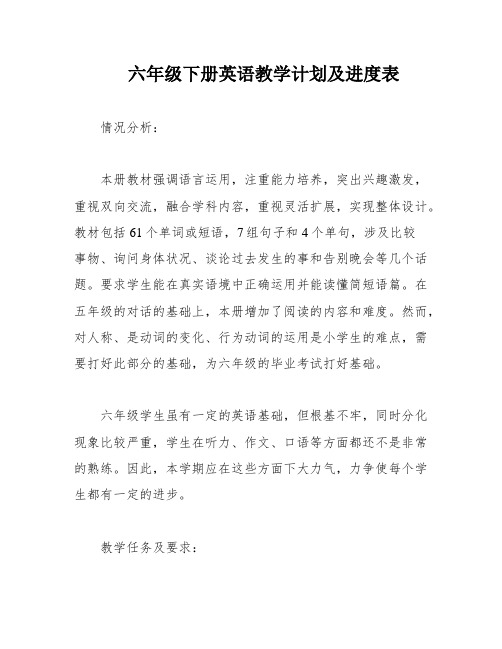
六年级下册英语教学计划及进度表情况分析:本册教材强调语言运用,注重能力培养,突出兴趣激发,重视双向交流,融合学科内容,重视灵活扩展,实现整体设计。
教材包括61个单词或短语,7组句子和4个单句,涉及比较事物、询问身体状况、谈论过去发生的事和告别晚会等几个话题。
要求学生能在真实语境中正确运用并能读懂简短语篇。
在五年级的对话的基础上,本册增加了阅读的内容和难度。
然而,对人称、是动词的变化、行为动词的运用是小学生的难点,需要打好此部分的基础,为六年级的毕业考试打好基础。
六年级学生虽有一定的英语基础,但根基不牢,同时分化现象比较严重,学生在听力、作文、口语等方面都还不是非常的熟练。
因此,本学期应在这些方面下大力气,力争使每个学生都有一定的进步。
教学任务及要求:1.能听、说、读、写61个单词或短语以及7组句子和4个单句。
(包括长度、重量、高度、看病、情感、周末和假期活动、旅行、晚会等几个话题)。
要求能在真实语境中正确运用并能读懂简短语篇。
2.能完成1个手工制作。
3.能听懂、会唱6首歌曲。
4.能听懂、会吟唱6首歌谣。
5.能完成4个自我评价活动。
6.能理解6个幽默小故事。
7.能了解6项简单的中西方文化知识。
方法措施:1.以活动为课堂教学的主要形式,设计丰富多彩的教学活动,让学生在乐中学、学中用,从而保证学生英语研究的可持续性发展。
2.通过听、说、读、写、唱、游、演、画、做等形式,进行大量的语言操练和练。
3.培养学生拼读音标的能力,确保学生自主研究的质量。
4.设计全面、高效的课外作业,培养学生良好书写惯,做到整洁、规范、正确地书写。
教研专题:培养学生研究英语兴趣,使学生研究英语真正从跟我学到我要学的转变。
PEP小学英语六年级下册教学计划及进度表:单元。
课题。
课时。
周Unit1.How tall are you。
6.1-2Unit2.What’s the matter。
Mike。
6.3-4st weekend。
6.5-6Unit4.My holiday。
PEP小学英语六年级上册教学计划及进度表(表格式)
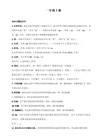
第一周:
Unit 1 period 1-4
第二周:
Unit 1 period 5-7 Unit 2 period 1
第三周:
Unit 2 period 2-5
第四周:
Unit 2 period 6-7
Unit 3 period 1-2
第五周:
National Day
第六周:
Unit 3 period 3-6
第十六周:
Revision: Unit 4—Unit 6
情
况
分
析
教材分析:
本学期的主要内容为PEP小学英语六年级上册,共有6个教学单元、2个复习单元。每单元分“A、B、C”三个部分,共12页,复习单元为6页。全书配有彩色卡通式插图,设计新颖活泼,生动有趣。本教材的设计与编写体现了对传统外语教学思想的继承和发展,在比较、分析和研究多种国内外小学英语教材的基础上,博采众长,取其精华,形成了本套教材特有的编写体系。本套教材的编写思路是以话题为纲,以交际功能和语言结构为主线,逐步引导学生运用英语完成有实际意义的语言任务,即:话题-功能-结构-任务。根据学生的实际情况,教师可以有选择地、灵活地安排教学内容,有针对性地设计课堂教学活动。
学生情况分析:
六年级学生虽有一定的英语基础,但根基不牢,同时分化现象比较严重,学生在听力、作文、口语等方面都还不是非常的熟练。本学期还应在这些方面下大力气,力争使每个学生都有一定的进步。
教学任务及
要求
1、能按四会、三会的要求掌握所学单词。
2、能按四会要求掌握所学句型。
3、能使用日常交际用语,活用四会句型,进行简单的交流,做到大胆开口,发音正确。
4、能在图片、手势、情境等非语言提示的帮助下,听懂清晰的话语和录音。
六年级英语教学计划安排表

教 学 内 容 安 排榆阳区学科教学学期计划 第3页周次 日期 计划内容 课时 备注 一3月2日至3月6日二3月9日至3月13日 制定计划 2Unit 1 How tall are you? 三3月16日至3月20日 Unit 1 How tall are you? 2 四3月23日至3月27日 Unit 1 How tall are you? 2五3月30日至4月3日 Unit 2 Last weekend. 2 六4月7日至4月10日 Unit 2 Last weekend. 2 七4月 13日至4月17日 Unit 2 Last weekend. 2 八4月20日至4月24日 Unit 3 Where did you go? 2 九4月27日至4月30日 Unit 3 Where did you go? 2 十5月4日至5月8日 Unit 3 Where did you go? 2周次日期计划内容课时备注十一5月11日至5月15日Review of units 1-3 2十二5月18日至5月22日Unit 4 Then and now. 2Unit 4 Then and now. 2十三5月25日至5月29日Unit 4 Then and now. 2十四 6 月1 日至6月5 日Recycle Mike’s happy days. 2十五6月8 日至6月12日Recycle Mike’s happy days. 2十六6月15日至6月19日General review 2十七6月23日至6月26日General review 2十八6月29日至7月3日General review 2十九7月6日至7月10日二十7月13日至7月17日榆阳区学科教学学期计划第4页榆阳区学科教学计划科目英语年级六学年2014 至2015 学期二执教王晓利学期学情分析本学期,我担任六年级两个班的英语教学工作。
这两个班共有学生89人,其中六一44人,六二45人。
XX——XX学年度六年级英语教学、备考打算及进度表

XX——XX学年度六年级英语教学、备考打算及进度表本学年总目标:一、知识目标:1.把握小学毕业考试范围之内的698个大体辞汇(专门是四会辞汇)、语法项目(如词的类型、时态及功能)和小学毕业考试所要求把握的固定短语搭配及句型话题等内容。
2.通过英语听、说、读、写的系统温习使学生形成初步的综合语言运用能力,增进心智进展,提高综合人文素养,使学生在语言技术、语言知识、情感态度、学习策略和文化意识等方面取得进展,同时树立起正确的考试观并形成行之有效的考试策略。
二、能力目标:1.通过扎实有效的温习课夯实语言基础;2.通过对知识系统的温习及梳理慢慢培育解题能力;3.通过按时按期的考试培育学生的良好的学习适应和解题技术。
三、要求:1.每一册的知识点(单词,句型,话题等)做到人人过关并进行拓展训练。
2.毕业考试范围内的辞汇(专门是四会辞汇和常见辞汇)、固定搭配、句型与话题等做到人人过关;3.直击考点:对准方向,通过精讲精炼及做相对应的题型及举一反三,夯实巩固语法功能及项目;4.对新出题型(仿写部份),以小学时期课文的语法项目、功能、句型与话题为载体,增强写作训练,形成有效的策略;5.培育学生良好的考试适应和答题技术(专门是应付灵活题型的技术)6.培育学生在平常做题和应考时的良好的时刻安排技术。
四、时刻整体安排:第一学期1.开学用一个月左右完成音标及第一册的讲义的温习内容;2. 第二个月到学期终止完成二到五册讲义的温习;3.第一学期完成第一册到第五册的教学,每一册的教学所历时间为一个月时刻左右A.要求每一册的单词,重点句子的明白得及运用做到人人过关B.教学中注重讲练结合,渗透毕业考试的题型及内容。
C.注重基础知识,夯实基础。
第一学期主抓基础,偏重对差生的辅导,提高合格率。
第二学期1.开学用一个半月温习第六、七册内容;2.用一个月依照毕业考试范围,进行分类温习,专项训练。
如(1)词类:按形容词,名词,动词,介词,连词等词性的分类归纳温习;(2)句型:按一样此刻时,此刻进行时,一样过去时和一样以后时等句型分类温习。
小学六年级上册英语教学计划及进度表

小学六年级上册英语教学计划及进度表
目标
本教学计划旨在帮助小学六年级学生提高英语听、说、读、写
的能力,并加深对英语文化的了解。
教学内容
教学内容将按照小学六年级英语课程标准进行安排,并结合学
生的研究需求和实际情况进行调整。
Unit 1: My Family
- 教学目标:学生能够正确使用家庭成员的英语词汇,并简单
介绍自己的家庭。
- 授课时间:2周
- 主要教学活动:词汇研究、听力练、口语表达、小组讨论
Unit 2: My School
- 教学目标:学生能够用英语描述学校的不同部分和日常活动。
- 授课时间:2周
- 主要教学活动:词汇研究、听力练、口语表达、阅读理解、
写作练
Unit 3: My Hobbies
- 教学目标:学生能够谈论自己的爱好,并参与与爱好相关的
对话。
- 授课时间:2周
- 主要教学活动:词汇研究、听力练、口语表达、角色扮演、
阅读理解、写作练
Unit 4: My City
- 教学目标:学生能够用英语描述自己所在城市的特点和景点。
- 授课时间:2周
- 主要教学活动:词汇研究、听力练、口语表达、阅读理解、
写作练
Unit 5: My Future
- 教学目标:学生能够用英语表达关于未来的计划和愿望。
- 授课时间:2周
- 主要教学活动:词汇研究、听力练、口语表达、阅读理解、写作练
教学进度表
以上是小学六年级上册英语教学计划及进度表,教学内容和进度可根据实际情况进行调整和安排。
希望通过本教学计划,学生们能够在英语学习中取得积极的进步。
小学六年级英语阅读计划表
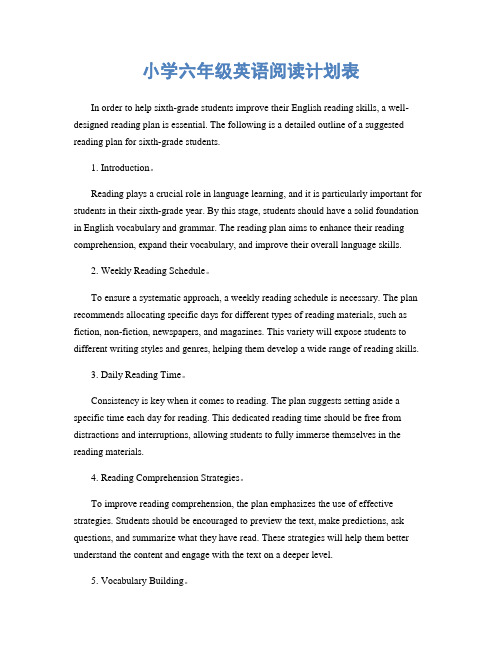
小学六年级英语阅读计划表In order to help sixth-grade students improve their English reading skills, a well-designed reading plan is essential. The following is a detailed outline of a suggested reading plan for sixth-grade students.1. Introduction。
Reading plays a crucial role in language learning, and it is particularly important for students in their sixth-grade year. By this stage, students should have a solid foundation in English vocabulary and grammar. The reading plan aims to enhance their reading comprehension, expand their vocabulary, and improve their overall language skills.2. Weekly Reading Schedule。
To ensure a systematic approach, a weekly reading schedule is necessary. The plan recommends allocating specific days for different types of reading materials, such as fiction, non-fiction, newspapers, and magazines. This variety will expose students to different writing styles and genres, helping them develop a wide range of reading skills.3. Daily Reading Time。
小学一年级至六年级英语教学工作计划含进度表

小学一年级至六年级英语教学工作计划含
进度表
一、教学目标:
1. 培养学生的英语听、说、读、写能力,使学生能用英语进行
简单的交流。
2. 帮助学生了解英语国家的文化及俗。
3. 为学生未来的研究和生活打下坚实的英语基础。
二、教学内容:
1. 英语单词、短语、句子的认读与模仿。
2. 针对语言应用的相关话题进行教学,如日常生活、学校生活、节日等话题。
3. 通过童话、儿歌等形式,培养学生的英语阅读能力。
4. 初步介绍英语语法知识。
三、教学方法:
1. 创设真实情境,激发学生研究兴趣。
2. 多方式教学,如课堂教学、游戏等。
3. 鼓励学生通过互动交流,多参与课堂活动。
4. 定期组织英语角,让学生在轻松愉悦的氛围中更好地练英语口语。
四、教学进度表:
阶段一:基础知识和技能的研究(9月-12月)
阶段二:语言功能的教学(1月-4月)
阶段三:语法知识的研究(5月-7月)
五、教学评估:
1. 学生定期进行听、说、读、写综合测试,以检查教学效果。
2. 教师对学生的表现进行任课学期结束后的综合评估。
评估包括学生听、说、读、写能力,参与活动的情况等。
六年级英语下册教学计划及进度表

人教版六年级英语下册教学计划及进度表一、指导思想以“英语课程标准”为宗旨,适应新课程改革的需要,面向全体学生,注重学生的人文素养,实践能力和创新精神.把握英语学科特点,倡导合作探究的学习。
培养学生的情感和人生价值观,关注学生的综合素质,为学生发展和终身发展奠定基础。
二、教材分析本学期六年级英语课所使用教材是:人教课标版下册英语教材,本套教材充分注重学生英语听说读写能力的培养和训练,努力为学习者营造语境,精心设计内容,在教学中安排了大量的有趣的教学活动,引导学生在轻松,积极向上的气氛中学习英语,使英语变的既容易又有趣.它以学生为中心,以主要人物的活动为主线,围绕最常用的,最基本的英语词汇、句型、交际会话等,逐步开展教学内容,符合小学生的年龄、心理特点和语言教学规律,具有很强的科学性。
全书共四个单元,每单元包括6课时,共 24课时.全书包括单词 100多,句型50个。
本册教材的特点是:1.强调语言运用。
2.注重能力培养3.突出兴趣激发4。
重视双向交流5。
融合学科内容6.重视灵活扩展7.实现整体设计。
三、学情分析六年级的学生两极分化比较严重,部分学生上课比较好动,自控能力差,学生积极性较差,这给教学带来了一定的难度.所以本学期应做好后进生的转化工作-—面向全体学生,以学生的发展为宗旨,始终把激发学生的学习兴趣放在首位,注意分层教学,引导学生端正学习态度,掌握良好的学习方法,培养学生良好的学习习惯。
四、教学措施1,注重情景教学,创设英语环境,营造学习气氛,使学生有更多的机会接触英语,感触英语,应用英语.2,结合学生的年龄特点,结合教学内容,设计适合六年级学生的课堂教学活动,调动学生的学习积极性。
3。
针对学生记,背单词难这一问题,巧用实物、卡片、chant 等来帮助进行单词教学向学生介绍优秀学生的学习方法,大家互相交流,共同进步.老师向学生介绍一些好方法,如:分类记忆法,滚学球记忆法,想象记忆法等。
4.对学生进行语音知识训练,教授国际音标,让学生从简单机械地模仿式学习,过渡到有正确的语音知识知指导英语学习的阶段,也为自学铺路.5,加强阅读训练和语法知识的渗透学习。
人教PEP六年级上册英语教学计划及进度安排表

人教PEP小学六年级上学期英语教学计划及进度安排表一、学生知识能力习惯态度分析六年级的学生对英语学习兴趣整体有所下降,两极分化比较严重。
所以本学期应做好后进生的转化工作。
作为教师应该面向全体学生,以学生的发展为宗旨,始终把激发学生的学习兴趣放在首位,注意分层教学,引导学生端正学习态度,掌握良好的学习方法,培养学生良好的学习习惯。
二、教学目的任务1、能按四会、三会的要求掌握所学单词。
2、能按四会要求掌握所学句型。
3、能使用日常交际用语,活用四会句型,进行简单的交流,做到大胆开口,发音正确。
4、能在图片、手势、情境等非语言提示的帮助下,听懂清晰的话语和录音。
5、进一步养成良好的书写习惯。
6、进一步养成听英语、读英语和说英语的良好习惯。
7、能运用相关的语言知识和技能,完成某项任务。
8、能演唱已学过的英语歌曲,诵读已学过的歌谣。
三、教材重点难点1、能按四会、三会的要求掌握所学单词。
2、能按四会要求掌握所学句型。
3、能使用日常交际用语,活用四会句型,进行简单的交流,做到大胆开口,发音正确。
4、能在图片、手势、情境等非语言提示的帮助下,听懂清晰的话语和录音。
四、主要措施1、以活动为课堂教学的主要形式,设计丰富多彩的教学活动,让学生在乐中学、学中用,从而保证学生英语学习的可持续性发展。
2、通过听、说、读、写、唱、游、演、画、做等形式,进行大量的语言操练和练习。
3、培养学生拼读音标的能力,确保学生自主学习的质量。
4、设计全面、高效的课外作业,培养学生良好的书写习惯,做到整洁、规范、正确地书写。
附:教学进度安排表年级:科目:教者:。
人教版(PEP)小学英语五,六年级寒假作业计划表
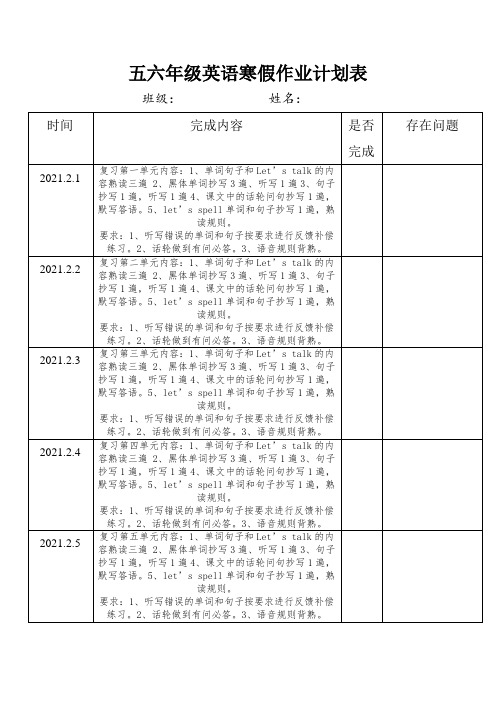
班级:姓名:
时间
完成内容
是否完成
存在问题
2021.2.1
复习第一单元内容:1、单词句子和Let’stalk的内容熟读三遍2、黑体单词抄写3遍、听写1遍3、句子抄写1遍,听写1遍4、课文中的话轮问句抄写1遍,默写答语。5、let’sspell单词和句子抄写1遍,熟读规则。
要求:1、听写错误的单词和句子按要求进行反馈补偿练习。2、话轮做到有问必答。3、语音规则背熟。
要求:1、可利用拓普教育、学测星等手机APP进行跟读练习。2、朗读视频传给英语教师进行点评订正;3、根据反馈自读直至完全熟练掌握
2021.2.24
预习内容:下册第二单元单词1、黑体单词做到会准确读、认读、听音辩词2、白体单词会认读即可。
要求:1、可利用拓普教育、学测星等手机APP进行跟读练习;2、认读视频传给英语教师进行点评订正;3、根据反馈自读直至Байду номын сангаас全熟练掌握
2021.2.9
复习一二三单元内容:1、黑体单词听写1遍、句子听写1遍、话轮问句抄写、答语默写1遍。
要求:务必做到全听全会,错误的一定要反馈补偿。可进行二次听写。
2021.2.10
复习四五六单元内容:1、黑体单词听写1遍、句子听写1遍、话轮问句抄写、答语默写1遍。
要求:务必做到全听全会,错误的一定要反馈补偿。可进行二次听写。
2021.2.6-7
休息
2021.2.8
复习第六单元内容:1、单词句子和Let’stalk的内容熟读三遍2、黑体单词抄写3遍、听写1遍3、句子抄写1遍,听写1遍4、课文中的话轮问句抄写1遍,默写答语。5、let’sspell单词和句子抄写1遍,熟读规则。
要求:1、听写错误的单词和句子按要求进行反馈补偿练习。2、话轮做到有问必答。3、语音规则背熟。
六年级小升初英语100天计划表制
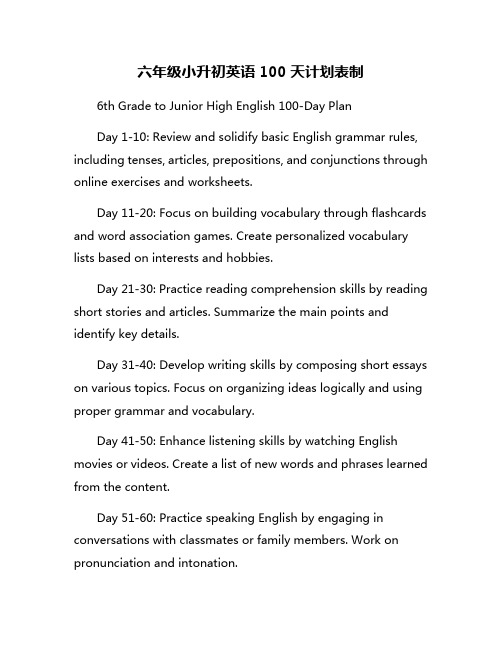
六年级小升初英语100天计划表制6th Grade to Junior High English 100-Day PlanDay 1-10: Review and solidify basic English grammar rules, including tenses, articles, prepositions, and conjunctions through online exercises and worksheets.Day 11-20: Focus on building vocabulary through flashcards and word association games. Create personalized vocabulary lists based on interests and hobbies.Day 21-30: Practice reading comprehension skills by reading short stories and articles. Summarize the main points and identify key details.Day 31-40: Develop writing skills by composing short essays on various topics. Focus on organizing ideas logically and using proper grammar and vocabulary.Day 41-50: Enhance listening skills by watching English movies or videos. Create a list of new words and phrases learned from the content.Day 51-60: Practice speaking English by engaging in conversations with classmates or family members. Work on pronunciation and intonation.Day 61-70: Review spelling and punctuation rules through spelling quizzes and grammar exercises. Focus on common mistakes and how to avoid them.Day 71-80: Explore different genres of literature, such as poetry, fiction, and non-fiction. Analyze the themes and writing styles of different authors.Day 81-90: Prepare for the Junior High English entrance exam by practicing past exam papers and mock tests. Identify areas of improvement and focus on them.Day 91-100: Review all topics covered in the 100-day plan and create a study schedule for continued improvement. Seek feedback from teachers or tutors to track progress.By following this 100-day plan, you will be well-prepared for the challenges of junior high English and beyond. Keep practicing and never give up on your English language goals! Good luck!。
小学六年级英语阅读计划表
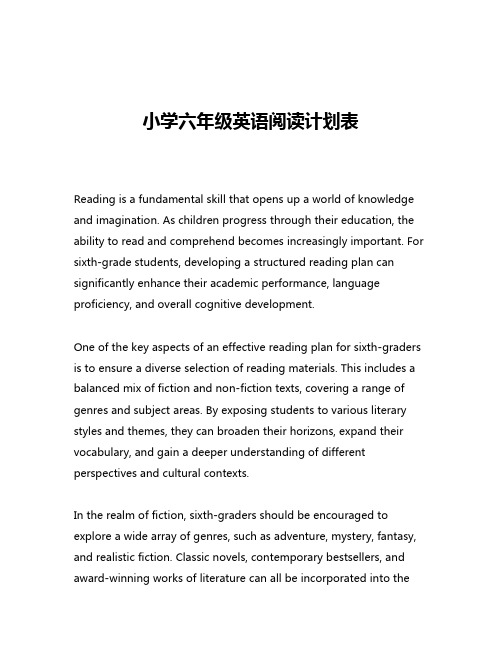
小学六年级英语阅读计划表Reading is a fundamental skill that opens up a world of knowledge and imagination. As children progress through their education, the ability to read and comprehend becomes increasingly important. For sixth-grade students, developing a structured reading plan can significantly enhance their academic performance, language proficiency, and overall cognitive development.One of the key aspects of an effective reading plan for sixth-graders is to ensure a diverse selection of reading materials. This includes a balanced mix of fiction and non-fiction texts, covering a range of genres and subject areas. By exposing students to various literary styles and themes, they can broaden their horizons, expand their vocabulary, and gain a deeper understanding of different perspectives and cultural contexts.In the realm of fiction, sixth-graders should be encouraged to explore a wide array of genres, such as adventure, mystery, fantasy, and realistic fiction. Classic novels, contemporary bestsellers, and award-winning works of literature can all be incorporated into thereading plan. These stories not only captivate the imagination but also provide valuable lessons about human nature, moral dilemmas, and the human experience.Alongside fiction, non-fiction texts should also play a crucial role in the reading plan. Informative books on history, science, geography, and current events can stimulate students' curiosity and help them develop a deeper understanding of the world around them. Biographies and autobiographies, in particular, can serve as inspirational examples of resilience, determination, and personal growth.To ensure that the reading plan is engaging and relevant, it is essential to incorporate the interests and preferences of the students themselves. Encourage them to share their favorite authors, genres, or topics, and tailor the reading list accordingly. This not only fosters a sense of ownership and investment in the reading process but also helps students develop a lifelong love for reading.In addition to the selection of reading materials, the reading plan should also include strategies for active engagement and comprehension. This may involve pre-reading activities, such as making predictions about the content or exploring the book's themes and characters. During the reading process, students can be encouraged to take notes, ask questions, and make connectionsbetween the text and their own experiences.Furthermore, the reading plan should incorporate opportunities for discussion and analysis. Whether it's through book clubs, literature circles, or in-class discussions, students should be encouraged to share their thoughts, interpretations, and insights about the books they have read. This not only enhances their critical thinking skills but also allows them to learn from their peers and gain a deeper appreciation for diverse perspectives.To reinforce the importance of reading and maintain momentum throughout the school year, the reading plan should include incentives and recognition for reading achievements. This could take the form of reading challenges, book-related rewards, or public acknowledgment of students who have made significant progress or reached reading milestones.Furthermore, the reading plan should be integrated with other academic subjects, enabling cross-curricular connections and reinforcing the relevance of reading across different disciplines. For instance, students could be tasked with reading historical fiction and then comparing the narrative to nonfiction accounts of the same historical events. This approach not only enhances comprehension but also demonstrates the interdisciplinary nature of reading and learning.To ensure the success of the reading plan, it is crucial to involve parents and caregivers in the process. Encourage families to create a conducive reading environment at home, set aside dedicated reading time, and engage in discussions about the books their children are reading. By fostering a collaborative approach between school and home, the reading plan can have a more profound and lasting impact on students' academic and personal growth.In conclusion, a well-designed reading plan for sixth-grade students is a powerful tool for enhancing their intellectual, emotional, and social development. By fostering a love for reading, exposing them to a diverse range of materials, and incorporating interactive strategies, educators can empower their students to become confident, critical thinkers who are equipped to navigate the complexities of the modern world. Through the implementation of a comprehensive reading plan, sixth-graders can embark on a journey of discovery, personal growth, and lifelong learning.。
六年级小升初英语计划表

六年级小升初英语计划表Here is the English essay on the topic of "A 6th Grade Plan for the Transition to Junior High School English":As the end of my time in elementary school approaches, I find myself eagerly anticipating the exciting challenges that lie ahead in junior high. The transition from sixth grade to seventh grade will bring about many changes, both academically and socially, and it is important that I prepare myself thoroughly. To ensure a smooth and successful move into junior high, I have developed a comprehensive plan to strengthen my English language skills over the coming year.First and foremost, I recognize the critical importance of expanding my English vocabulary. In the years ahead, I will be expected to understand and utilize a far more extensive range of words across all my academic subjects. To this end, I will make a concerted effort to learn at least 10 new words per week, focusing on terms that are commonly used in the types of texts and discussions I anticipate encountering in my junior high English classes. I will study the definitions, parts of speech, and contextual usage of these new words, and I will make a point of incorporating them into my own speaking and writing on a regular basis.In addition to vocabulary development, I will also dedicate substantial time and energy to improving my reading comprehension skills. I plan to read a wide variety of both fiction and non-fiction materials, ranging from classic novels to current event articles, in order to expose myself to diverse writing styles and content. As I read, I will consciously work on strategies such as identifying the main ideas, distinguishing relevant details from extraneous information, and making logical inferences. I will also practice annotating the text, underlining key points, and summarizing the essential takeaways in my own words. By honing these critical reading skills, I will be better equipped to handle the increased academic demands of junior high.Furthermore, I recognize that writing will be an area of heightened emphasis in my future English courses. Therefore, I will make a concerted effort to enhance my composition abilities over the coming year. I will experiment with different writing genres, from persuasive essays to creative narratives, in order to become a more versatile and well-rounded writer. I will pay close attention to elements such as organization, coherence, and the effective use of supporting evidence. Additionally, I will seek feedback from my current English teacher and implement revisions to improve the quality of my written work.Equally important, I will work to further develop my oral communication skills in preparation for the discussions, presentations, and collaborative projects that will be integral components of my junior high English classes. I will practice articulating my thoughts and ideas clearly and concisely, both in informal conversations and more formal speaking situations. I will also strive to become an active and engaged listener, maintaining eye contact, asking thoughtful questions, and building upon the contributions of my peers.Finally, I believe it is crucial that I cultivate strong study habits and a positive, motivated attitude as I embark on this new academic chapter. I will create a dedicated workspace free from distractions, establish a consistent routine for completing homework and reviewing material, and employ effective time management strategies. Moreover, I will approach my English studies with enthusiasm and a willingness to take risks, embracing challenges as opportunities for growth and learning.By implementing this multifaceted plan, I am confident that I will be well-equipped to tackle the rigors of junior high English. The skills and strategies I develop over the coming year will serve me not only in my language arts coursework, but across all academic disciplines. Most importantly, I am excited by the prospect of continued intellectual growth and the chance to become an even more capable,confident, and well-rounded student. I look forward to the adventure that lies ahead with eager anticipation.。
- 1、下载文档前请自行甄别文档内容的完整性,平台不提供额外的编辑、内容补充、找答案等附加服务。
- 2、"仅部分预览"的文档,不可在线预览部分如存在完整性等问题,可反馈申请退款(可完整预览的文档不适用该条件!)。
- 3、如文档侵犯您的权益,请联系客服反馈,我们会尽快为您处理(人工客服工作时间:9:00-18:30)。
6、能运用已学过的句型说一些简单的句子。
教材的重点和难点
1、能按四会、三会的要求掌握所学单词。
2、能按四会要求掌握所学句型。
3、能使用日常交际用语,活用四会句型,进行简单的交流,做到大胆开口,发音正确。
4、能在图片、手势、情境等非语言提示的帮助下,听懂清晰的话语和录音。
教 学 计 划 表
煎茶小学2011——2012年度下学期6年级英语学科教师周黄丽2012年2月8日
学生基本状况及知识现状分析
六年级学生在3——5年级时接触过英语,但是对英语学科的学习知之甚少,内心充满了疑惑好奇。另外,小学生的特点是活泼、好动,求知欲望强烈。针对以上情况,在教学过程中,一定要抓住这一特点,充分调动他们的积极,通过听、读说等各种方式,引导学生学习好英语课程。
7、能运用相关的语言知识和技能,完成教学主要任务和要求
任务:10个模块
要求:1、能在图片、手势的帮助下,听懂语调自然的短句或录音材料。
2、能听懂一些配图小故事。
3、能分辨在一组词中的不同发音,找出不属于同一类的单词。
4、能用英语回答问题并做到发音清楚,重音正确。
教 学 进 度 表
学月
日期
计划进度
实际进度
备注
第一学月
2月8日
——
3月1日
第1、2模块
第二学月
3月2日
——
4月1日
第3、4模块
第三学月
4月2日
——
5月1日
第5、6、7模块
第四学月
5月2日
——
6月1日
第8、9、10模块
第五学月
6月2日
——
6月29日
复习考试
本学期教学工作目标
1、能按四会、三会的要求掌握所学单词。
2、能按四会要求掌握所学句型。
3、能使用日常交际用语,活用四会句型,进行简单的交流,做到大胆开口,发音正确。
4、能在图片、手势、情境等非语言提示的帮助下,听懂清晰的话语和录音。
5、进一步养成良好的书写习惯。
6、进一步养成听英语、读英语和说英语的良好习惯。
本学期提高教学质量的措施
1、以活动为课堂教学的主要形式,设计丰富多彩的教学活动,让学生在乐中学、学中用,从而保证学生英语学习的可持续性发展。
2、通过听、说、读、写、唱、游、演、画、做等形式,进行大量的语言操练和练习。
3、培养学生拼读音标的能力,确保学生自主学习的质量。
4、设计全面、高效的课外作业,培养学生良好的书写习惯,做到整洁、规范、正确地书写。
